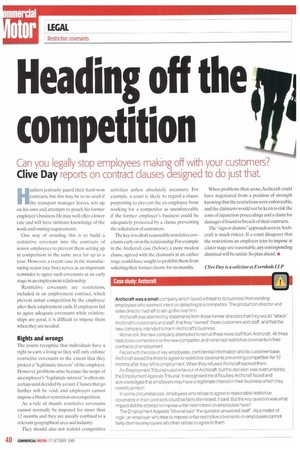Heading off the competition
Page 42

If you've noticed an error in this article please click here to report it so we can fix it.
Can you legally stop employees making off with your customers? Clive Day reports on contract clauses designed to do just that.
Hauliers jealously guard their hard-won contracts, but this may be to no avail if the transport manager leaves, sets up on his own and attempts to poach his former employer's business. He may well offer a lower rate and will have intimate knowledge of the work and routing requirements.
One way of avoiding this is to build a restrictive covenant into the contracts of senior employees to prevent them setting up in competition in the same area for up to a year. However, a recent case in the manufacturing sector (see box) serves as an important reminder to agree such covenants at an early stage in an employment relationship.
Restrictive covenants are restrictions, included in an employment contract, which prevent unfair competition by the employee after their employment ends. If employers fail to agree adequate covenants while relationships are good, it is difficult to impose them when they are needed.
Rights and wrongs
The courts recognise that individuals have a right to earn a living so they will only enforce restrictive covenants to the extent that they protect a "legitimate interest" of the employer. However, problems arise because the scope of an employer's "legitimate interest" is often uncertain until decided by a court. Clauses that go further will be void, and employers cannot impose a blanket restriction on competition.
As a rule of thumb. restrictive covenants cannot normally be imposed for more than 12 months and they are usually confined to a relevant geographical area and industry.
They should also not restrict competitive activities unless absolutely necessary. For example, a court is likely to regard a clause purporting to prevent the ex-employee from working for a competitor as unenforceable if the former employer's business could be adequately protected by a clause preventing the solicitation of customers.
The key is to draft reasonable restrictive covenants early on in the relationship. For example in the Archcraft case (below), a more modest clause, agreed with the claimants at an earlier stage, could have sought to prohibit them from soliciting their former clients for six months. When problems then arose, Archcraft could have negotiated from a position of strength knowing that the restrictions were enforceable, and the claimants would not be keen to risk the costs of injunction proceedings and a claim for damages if found in breach of their contracts.
The "sign or dismiss" approach seen in Archcraft is much riskier. If a court disagrees that the restrictions an employer tries to impose at a later stage are reasonable, any corresponding dismissal will be unfair. So plan ahead. •










































































































































































































